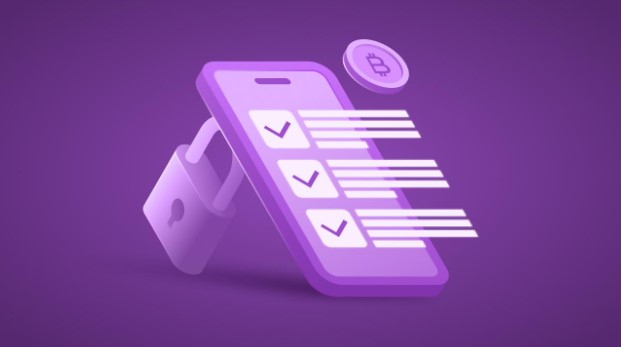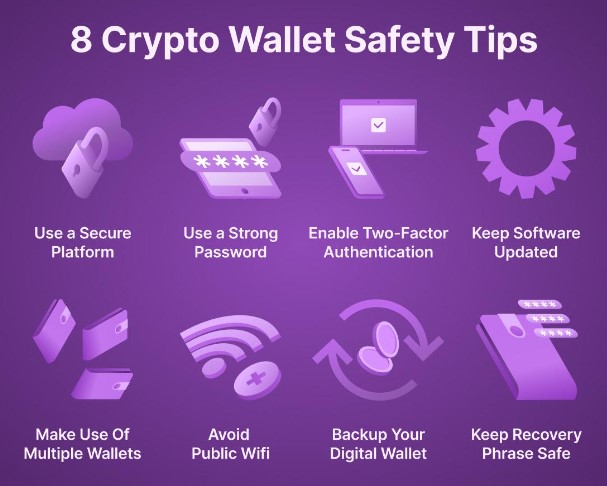
In the ever-evolving landscape of digital finance, crypto wallets play a pivotal role in safeguarding your valuable digital assets. Understanding the nuances of crypto wallet security is crucial for anyone venturing into the realm of cryptocurrencies. Let’s delve into the key aspects of crypto wallet security and explore eight essential tips to ensure the safety of your digital wealth.
What is a Crypto Wallet?
Much like traditional wallets, crypto wallets serve as a secure means to share digital assets akin to cash. In the dynamic landscape of cryptocurrencies, they have emerged as sought-after systems facilitating the storage, management, and transaction of various projects, tokens, and coins. However, despite their prevalence, many individuals find themselves grappling with the intricacies of these wallets. With an abundance of choices available in the market, navigating through the diverse array of wallets has proven challenging for new investors.
A cryptocurrency wallet is a digital tool that allows users to store, manage, and interact with their cryptocurrency assets. Similar to regular wallets that hold physical cash, cryptocurrency wallets enable users to send, receive, and monitor their digital currencies, but with enhanced security and permanence. Given the diverse range of projects, tokens, and coins in the crypto space, users may need to use separate wallets to store different assets.
At its core, a cryptocurrency wallet consists of two essential components: a public key and a private key. The public key functions as an address that can be shared with others for transactions, akin to a PayPal email. On the other hand, the private key serves as a password, providing access to the wallet and control over the associated funds. It’s crucial to keep the private key confidential, as sharing it could grant complete access to the stored assets.

Types of Crypto Wallets
There are three main types of cryptocurrency wallets:
- Software Wallets (Online Wallets): These wallets are software programs or systems that are usually online-based. Users can access their keys through their account. However, there is a risk associated with the security of the online platform.
- Hardware Wallets: For those who prioritize security and want to keep their information offline, hardware wallets offer a physical solution. These are USB-like devices that store public and private keys. They provide enhanced security measures, such as a key phrase system for access. Losing access to this key phrase, though, can result in permanent loss of funds.
- Paper Wallets: Paper wallets involve physically writing down public and private keys, often accompanied by QR codes. While this method is highly secure, it is less practical due to the risk of losing or damaging the paper. Paper wallets are suitable for those looking to secure a large sum of money for long-term storage.
H2 8 Crypto Wallet Security Tips
Here is a list of tips you can use to secure your cryptocurrency wallets and navigate the dynamic landscape of digital assets. As the world of cryptocurrency continues to evolve, ensuring the safety of your investments is paramount. These eight practical tips, ranging from choosing a secure platform to safeguarding your recovery phrase, are designed to empower you with the knowledge and practices needed to enhance the security of your crypto holdings.
- Use a Secure Platform:
- Research the reputation of crypto wallet platforms before choosing one. Look for well-established providers with a history of security and positive user reviews.
- Consider open-source wallets where the code is publicly available and can be audited by the community for security.
- Use a Strong Password:
- Aim for a password that is at least 12 characters long and includes a mix of uppercase and lowercase letters, numbers, and special characters.
- Avoid using easily guessable information, such as names, birthdays, or common words. Consider using a passphrase that is memorable to you but difficult for others to guess.
- Enable Two-Factor Authentication (2FA):
- Implement 2FA using methods such as authenticator apps, hardware tokens, or SMS codes.
- Regularly review and update your 2FA settings, and ensure that backup options are set up in case you lose access to your primary authentication method.
- Keep Software Updated:
- Regularly check for updates to your wallet software and associated apps. Developers often release patches to address security vulnerabilities.
- Enable automatic updates if available, but verify the authenticity of updates to avoid falling victim to phishing attempts.
- Make Use of Multiple Wallets:
- Separate your holdings based on the frequency of use. Use a hot wallet for small, everyday transactions and a cold wallet for long-term storage of larger amounts.
- Consider diversifying your crypto holdings across different wallets and even different types of wallets (software, hardware, paper) for added security.
- Avoid Public Wifi:
- Public Wi-Fi networks are susceptible to hacking. Avoid accessing your crypto wallets on public networks to prevent potential eavesdropping or man-in-the-middle attacks.
- Use a virtual private network (VPN) if you must connect to the internet in a public place, ensuring an extra layer of encryption.
- Backup Your Digital Wallet:
- Regularly back up your wallet data, including private keys and seed phrases, to a secure, offline location. This protects you in case of device loss, theft, or failure.
- Test the restoration process with a small amount of cryptocurrency to ensure that your backup is functional.
- Keep Your Recovery Phrase Safe:
- Store your recovery phrase in a physically secure location, such as a safe or a tamper-evident container. Avoid digital storage to mitigate the risk of online hacking.
- Share your recovery phrase with trusted individuals only in extreme cases, such as incapacity or death, and consider using a secure method to convey the information.

Conclusion
In the dynamic world of cryptocurrency, prioritizing the security of your crypto wallet is paramount. By understanding the fundamental principles of wallet security and implementing the eight tips outlined above, you can significantly reduce the risk of falling victim to cyber threats. As the digital landscape continues to evolve, a proactive and informed approach to crypto wallet security ensures that your journey into the realm of cryptocurrencies remains not only exciting but also secure.

TheBitcoinNews.com – Bitcoin News source since June 2011 –
Virtual currency is not legal tender, is not backed by the government, and accounts and value balances are not subject to consumer protections. TheBitcoinNews.com holds several Cryptocurrencies, and this information does NOT constitute investment advice or an offer to invest.
Everything on this website can be seen as Advertisment and most comes from Press Releases, TheBitcoinNews.com is is not responsible for any of the content of or from external sites and feeds. Sponsored posts are always flagged as this, guest posts, guest articles and PRs are most time but NOT always flagged as this. Expert opinions and Price predictions are not supported by us and comes up from 3th part websites.
Advertise with us : Advertise
Our Social Networks: Facebook Instagram Pinterest Reddit Telegram Twitter Youtube










